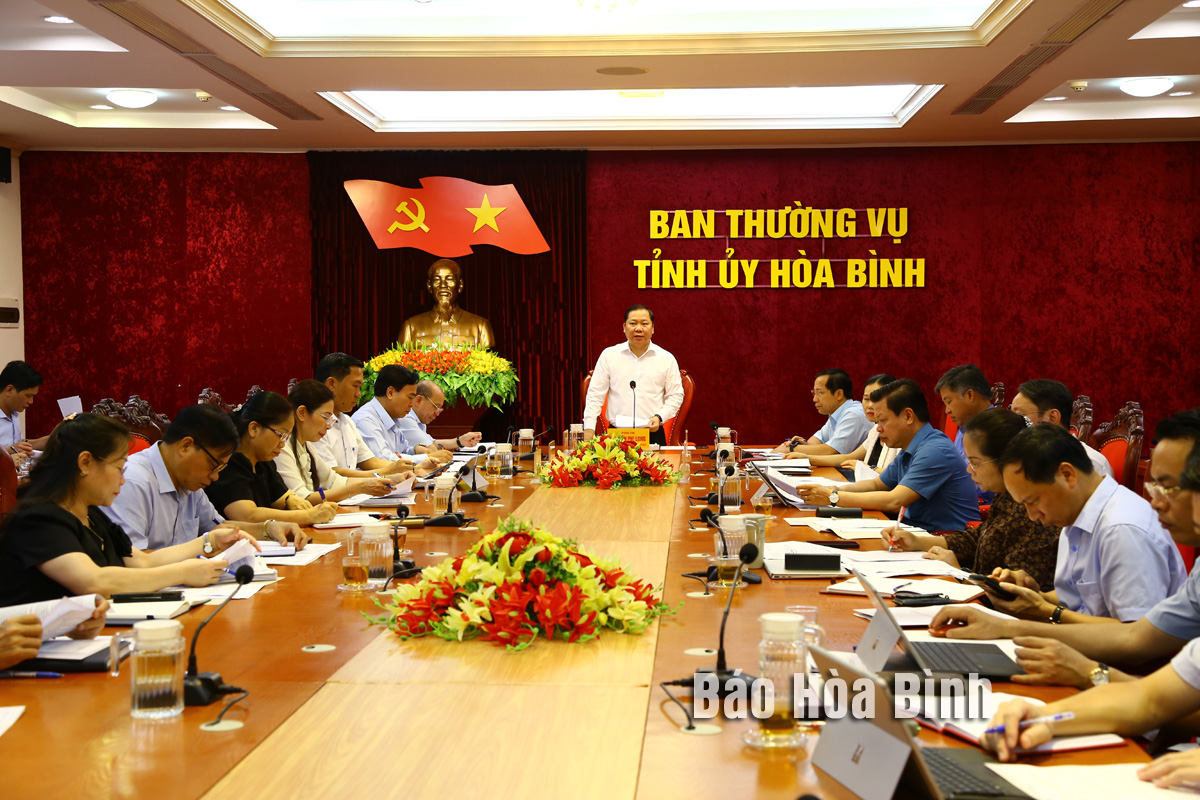
The Hoa Binh provincial Party Committee’s Standing Board organised a conference on June 11 to announce the decision to establish a steering committee for implementing the project on preserving and promoting values of the Muong ethnic group’s culture and the Hoa Binh Civilisation in the 2023 - 2030 period. Following that, the first meeting of this steering committee also took place. Nguyen Phi Long, alternate member of the Party Central Committee, Secretary of the provincial Party Committee and head of the steering committee, chaired the events.
Nguyen Phi Long, alternate member of the Party Central
Committee and Secretary of the provincial Party Committee, speaks at the
conference.
The provincial Department of Culture, Sports and
Tourism reported that a meeting was held on January 17 to disseminate the
project. The department has coordinated with the Hoa Binh Newspaper and the
province’s Radio and Television Station to boost communications about the
scheme’s targets and focal tasks, along with the values of the Muong culture
and the Hoa Binh Civilisation. Departments, sectors, and the 10 district-level
localities have also built and issued their implementation plans.
At the meeting, the provincial Party Committee’s
organisation board announced the decision to establish the steering committee
for project implementation. Accordingly, the Secretary of the provincial Party
Committee acts as head of this steering committee, a Vice Secretary of the
provincial Party Committee and the chairperson of the provincial People’s
Committee as standing deputy heads, another Vice Secretary of the provincial Party
Committee and the chairperson of the provincial People’s Council as deputy
heads, and leaders of departments and sectors as members.
Participants gave opinions about the working
rules and tasks for members of the steering committee. They also proposed an
advisory group and an assistant group for the committee be set up.
In his remarks, Nguyen Phi Long, Secretary of
the provincial Party Committee and head of the steering committee, said under
the Government and province’s directions, the project on preserving and
promoting the values of the Muong ethnic culture and the Hoa Binh Civilisation
in the 2023 - 2030 period has been carried out methodologically. The
establishment of the steering committee is important to carrying out concrete
tasks.
He underlined the viewpoint that upholding
cultural values is to serve tourism development, people are the main
stakeholders in cultural value preservation and promotion, the preservation and
promotion of good values must be carried out at the same time with eradicating
backward customs, and the values of the Muong culture and the Hoa Binh
Civilisation should be turned into development resources.
The official affirmed that preserving and
promoting cultural values are a long-term task, so members of the steering
committee, sectors, and localities need to build detailed implementation plans.
The advisory group needs to include people with profound knowledge and rich
experience from central agencies and localities, artisans, along with
prestigious persons. Besides, it is necessary to devise appropriate mechanisms
and policies for implementing the project.
Hoa Binh province is undergoing a dynamic transformation amid Vietnam’s national digital transition. Building on Poliburo’s Resolution No. 57-NQ/TW on breakthroughs in science, technology, innovation, and national digital transformation, the province has rolled out a wide range of practical action plans. A standout initiative is the "Digital Literacy for All” movement, an effort to ensure that no one is left behind in the digital era.
Hoa Binh province is undergoing a dynamic transformation in the wake of the national digital transformation movement. Building on Resolution No. 57-NQ/TW of the Politburo on breakthroughs in science, technology, innovation, and national digital transformation, the province has implemented a wide range of practical action plans. A standout initiative is the "Digital Literacy for All” movement ambitious effort to ensure that no one is left behind in the digital age.
With a spirit of unity and proactive problem-solving, the Party Committee, the government and the people of Dong Lai Commune (Tan Lac District) have made great strides in implementing the resolutions of the 24th Party Congress of the commune for the 2020 - 2025 term. Focusing on leadership and practical actions, the commune has brought the Party’s resolutions into daily life, creating strong impacts and pushing the local development forward.
Amid the nationwide push for digital transformation, young people in Hoa Binh Province are stepping up as dynamic pioneers, applying technology to enhance Youth Union operations and expand the reach of youth-led initiatives. Through creativity and adaptability, Youth Union organizations at all levels have introduced a series of practical solutions, contributing to modern governance and community development.
In recent years, An Nghia commune, located in Lac Son district, has stepped up administrative reform, focusing on improving the quality and efficiency of its single-window service unit for receiving and processing administrative procedures. These improvements have helped create favourable conditions for local residents and organisations to handle administrative procedures, contributing to the commune’s broader socio-economic development.
The Prime Minister-approved master plan to develop the multi-use value of forests ecosystems through 2030, with a vision to 2050, aims to improve the management and sustainable use of forest resources, create jobs, increase incomes, and improve the living standards of ethnic minorities, people in mountainous and remote areas, forest workers and those living near forests.



